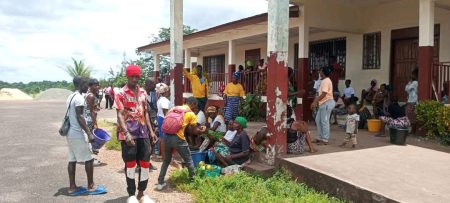Liberia’s Maternal Mortality Crisis: A Call for Concerted Action
Liberia’s Minister of Health, Dr. Louise Mapleh Kpoto, has issued a stark warning about the nation’s maternal mortality crisis. Addressing the 2025 National Health Summit, she characterized each maternal death as a tragedy, a profound loss, and a future unrealized. She emphasized the urgent need for collective action to address this critical issue, highlighting quality care as a crucial tool in reducing maternal deaths. Dr. Kpoto’s impassioned plea underscores the gravity of the situation and the shared responsibility of all stakeholders in confronting this challenge. Her call to action emphasizes the need for a unified vision, guided by the principles of equity, quality, and accountability, ensuring that no woman or child is left behind in the pursuit of improved maternal health outcomes. This sets the stage for a comprehensive and collaborative effort to address the root causes of maternal mortality and improve the health and well-being of mothers and newborns across Liberia.
The urgency of the situation was further amplified by Dr. Moses Massaquoi, Country Director of the Christian Health Association of Liberia, who presented data illustrating persistently high maternal mortality rates. He underscored the need for immediate action, advocating for accelerated equity funding and improved infrastructure, particularly in underserved rural areas. Recognizing the limitations of policy alone, Dr. Massaquoi stressed the critical importance of enforcement and sustainable financing to ensure the effectiveness of interventions. He also cautioned against diverting ambulances from clinics for other emergencies, highlighting the fragility of the emergency response system and the need for its robust and consistent availability for maternal health needs. This data-driven perspective provides a clear picture of the challenges and reinforces the need for immediate and sustained interventions.
Dr. Massaquoi’s emphasis on collaboration extended to the private sector, urging them to contribute their expertise and resources to this critical national endeavor. This call for a multi-sectoral approach recognizes the complexity of the challenge and the need for diverse perspectives and resources to effectively address it. The private sector’s involvement can bring crucial innovations, efficiencies, and additional resources to the table, strengthening the overall effort to reduce maternal mortality. This collaborative spirit is essential for achieving sustainable and impactful change.
The 2025 National Health Summit, themed "Unlocking the Potential for Improved Health Outcomes: A Pathway to Maternal & Neonatal Mortality Reduction," brought together stakeholders from across Liberia. This national gathering served as a platform to collectively address the deeply rooted challenges within the health system that contribute to high maternal mortality rates. The summit provided an opportunity for open dialogue, knowledge sharing, and the development of actionable strategies. By bringing together diverse perspectives and expertise, the summit aimed to forge a unified path towards achieving significant improvements in maternal and neonatal health outcomes.
The summit’s focus on maternal and neonatal mortality underscores the interconnectedness of these two critical health indicators. Addressing maternal health directly impacts neonatal health, as healthy mothers are more likely to give birth to healthy babies. By focusing on both aspects, the summit recognizes the importance of a holistic approach to improving the health and well-being of mothers and their newborns. This comprehensive strategy can lead to more effective and sustainable improvements in overall health outcomes.
The Minister of Health’s call for concerted efforts to reduce Liberia’s maternal death toll resonates deeply. The summit serves not only as a platform for discussion but also as a catalyst for action. The collective commitment of stakeholders, including government agencies, healthcare providers, civil society organizations, and the private sector, is crucial for translating the summit’s discussions into tangible improvements in maternal and neonatal health. The urgency of the situation demands immediate and sustained action to ensure that every woman and child has access to quality healthcare and the chance to thrive. This commitment to action is the ultimate measure of the summit’s success and its contribution to a healthier future for Liberia’s mothers and children.














